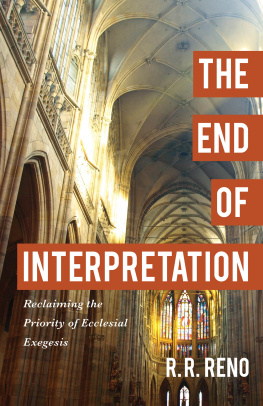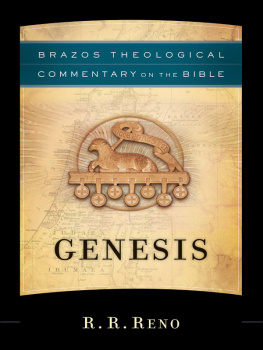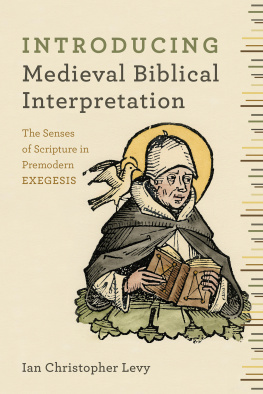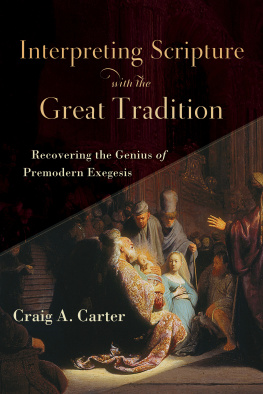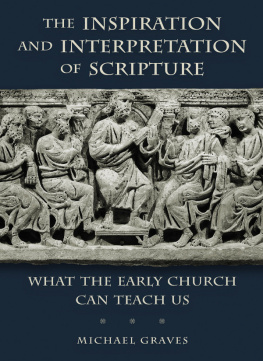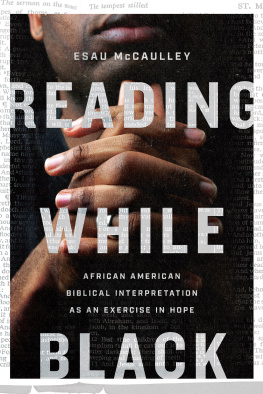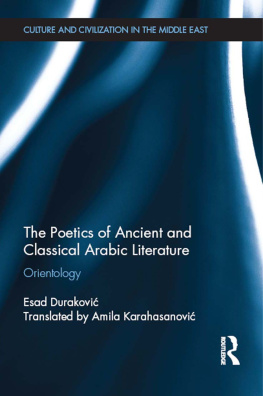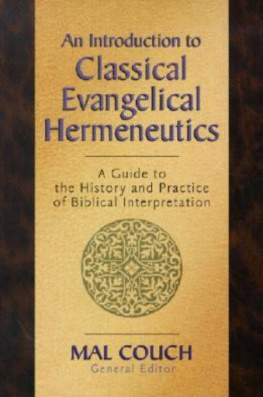R. R. Reno - The End of Interpretation: Reclaiming the Priority of Ecclesial Exegesis
Here you can read online R. R. Reno - The End of Interpretation: Reclaiming the Priority of Ecclesial Exegesis full text of the book (entire story) in english for free. Download pdf and epub, get meaning, cover and reviews about this ebook. year: 2022, publisher: Baker Publishing Group, genre: Religion. Description of the work, (preface) as well as reviews are available. Best literature library LitArk.com created for fans of good reading and offers a wide selection of genres:
Romance novel
Science fiction
Adventure
Detective
Science
History
Home and family
Prose
Art
Politics
Computer
Non-fiction
Religion
Business
Children
Humor
Choose a favorite category and find really read worthwhile books. Enjoy immersion in the world of imagination, feel the emotions of the characters or learn something new for yourself, make an fascinating discovery.
The End of Interpretation: Reclaiming the Priority of Ecclesial Exegesis: summary, description and annotation
We offer to read an annotation, description, summary or preface (depends on what the author of the book "The End of Interpretation: Reclaiming the Priority of Ecclesial Exegesis" wrote himself). If you haven't found the necessary information about the book — write in the comments, we will try to find it.
R. R. Reno: author's other books
Who wrote The End of Interpretation: Reclaiming the Priority of Ecclesial Exegesis? Find out the surname, the name of the author of the book and a list of all author's works by series.
The End of Interpretation: Reclaiming the Priority of Ecclesial Exegesis — read online for free the complete book (whole text) full work
Below is the text of the book, divided by pages. System saving the place of the last page read, allows you to conveniently read the book "The End of Interpretation: Reclaiming the Priority of Ecclesial Exegesis" online for free, without having to search again every time where you left off. Put a bookmark, and you can go to the page where you finished reading at any time.
Font size:
Interval:
Bookmark:
Reno here urges us to turn conventional exegetical wisdom on its head: instead of doing theology in accordance with Scripture, we should be reading Scripture in accordance with church doctrine. Protestants may (again) protest, yet the doctrines that guide Renos theological interpretation are themselves the result of the churchs painstaking attempt to read Scripture rightly. The End of Interpretation is both a bold claim about what it means to be biblical and a helpful illustration of the state of the art of theological exegesis by one of its foremost proponents.
Kevin J. Vanhoozer , Trinity Evangelical Divinity School
A still largely unrealized ambition of Vatican II was to foster a true revival of the Bible in the life of the Church. Inspired by the great ressourcement theologians, the fathers of the council wanted the Scriptures to inform every aspect of Catholicism. In this splendidly written and bracing text, Reno shows us what a truly ecclesial interpretation of the Bible looks like.
Most Reverend Robert Barron , Auxiliary Bishop of Winona-Rochester, Minnesota
With this book, Dr. Reno has provided an excellent treatment of the ever-present tension that all thoughtful Christians feel between biblical exegesis and theological statements, between the desire to maintain the uniqueness of biblical authority while also respecting the churchs historic teaching. Unashamedly Catholic, he nevertheless writes for an ecumenical audience, and thoughtful Protestants will find much here to help them as they address these matters from their perspective and navigate questions of tradition, higher criticism, and the place of faith and reason in the theological task. The first chapter, on the nature of theological exegesis, is where Dr. Reno expounds the key idea of the presumption of accordance. This alone is worth the price of the book. But the gems continue, with, among other things, a thoughtful reappraisal of Origen and a provocative engagement with the Reformation. This book will be on the reading lists of my theology classes from now on.
Carl R. Trueman , Grove City College
With characteristic clarity, Rusty Reno dismantles the modern assumption that an intellectually responsible approach to the Bible requires setting theology aside and embracing some sort of mythical objectivity. Instead, Reno here defends an approach to exegesis from within theology. He offers a collection of case studies that illustrate how such theological exegesis has and should function for Christians. He also considers how theological exegesis has functioned throughout Christian history. Renos tone is both reasonable and pastoral, modeling what it means to do exegesis from a place of intellectual submission within a community and urging Christian theologians starting from such a place to plunge boldly into dialogue with Scripture, allowing their knowledge of the Christian theological tradition to inform their reading of Scripture and allowing their reading of Scripture to strengthen their connection to that tradition. Overall, a hopeful and encouraging read.
Laura A. Smit , Calvin University
There is more than a half century of argument contained in the double entendre of this books title. Reno is recalling exegetes and theologians to the original purpose of their task, but he is also calling for the abandonment of certain conditions that have been imposed on biblical interpretation: critical minimalism, for example, and the bracketing of faith commitments. In 1988, Joseph Ratzinger urged academics to overcome the dualism that separated exegesis from theology. This requires us not to reject the historical method but, rather, to subordinate it to a hermeneutic of faith. In identifying the end of interpretation, Reno plots the trajectory of something far greater than anything weve known in my lifetime: reading Scripture from the heart of the churchin the great traditionand not surrendering it to the canons of the secular academy.
Scott Hahn , Franciscan University of Steubenville
This book may not have all the answers to the thorny questions of biblical hermeneutics after the demise of the historical-critical approach, but it at least points us in the right direction by advocating for the priority of ecclesial exegesis. Since the Bible was given to the church by God, it must be interpreted with its end, or purpose, in mind. Reno shows that true doctrine neither supersedes nor undermines the Bible but rather accords with it. In premodern times, doctrine and exegesis informed each other, and they should do so again.
Craig A. Carter , Tyndale University; author of Interpreting Scripture with the Great Tradition: Recovering the Genius of Premodern Exegesis
2022 by R. R. Reno
Published by Baker Academic
a division of Baker Publishing Group
PO Box 6287, Grand Rapids, MI 49516-6287
www.bakeracademic.com
Ebook edition created 2022
All rights reserved. No part of this publication may be reproduced, stored in a retrieval system, or transmitted in any form or by any meansfor example, electronic, photocopy, recordingwithout the prior written permission of the publisher. The only exception is brief quotations in printed reviews.
Library of Congress Cataloging-in-Publication Data is on file at the Library of Congress, Washington, DC.
ISBN 978-1-4934-3826-6
Unless otherwise indicated, Scripture quotations are from the New Revised Standard Version of the Bible, copyright 1989 National Council of the Churches of Christ in the United States of America. Used by permission. All rights reserved.
Scripture quotations labeled KJV are from the King James Version of the Bible.
Scripture quotations labeled RSV are from the Revised Standard Version of the Bible, copyright 1946, 1952 [2nd edition, 1971] National Council of the Churches of Christ in the United States of America. Used by permission. All rights reserved worldwide.
Baker Publishing Group publications use paper produced from sustainable forestry practices and post-consumer waste whenever possible.
For Ephraim
Endorsements
Half Title Page
Title Page
Copyright Page
Dedication
Introduction
1. What Makes Exegesis Theological?
2. Theology and Interpretation
3. Origen and Spiritual Reading
4. Reformation Controversy and Biblical Interpretation
5. In the Beginning
6. That They All May Be One
7. Law, Loyalty, and Love
8. An Exegetical Postmortem
Acknowledgments
Index
Back Cover
In 1988, then Cardinal Joseph Ratzinger delivered a lecture in New York: Biblical Interpretation in Crisis. He observed that, after two hundred years of historical-critical study of the Bible, we need a better synthesis between the historical and theological methods. Achieving this goal requires careful critical thinking about historical criticism, which often claims far greater certainty for its results than closer inspection shows appropriate. And the future Pope Benedict XVI observed that any textespecially sacred Scripturewill give up the full treasure of its meaning only to those who approach with sympathetic hearts open to hearing what is being said rather than with an eagerness to pigeonhole the text in accord with pet ideas and prearranged schemes.
As befits an address by a former theology professor, Biblical Interpretation in Crisis was a closely argued lecture. The themes Ratzinger raised remain salient to anyone who wishes to think clearly about the limits (and achievements) of historical criticism and other modern methods of biblical interpretation. Yet the turmoil surrounding his lecture suggests that long-standing questions concerning hermeneutics, philosophy, and textual methods are secondary in our time, not primary. Ratzinger was then head of the Vaticans Congregation for the Doctrine of the Faith, the office in Rome charged with the task of articulating and enforcing doctrinal standards. Among those standards are moral teachings condemning homosexual acts. As a consequence, his presence in New York attracted gay-rights protesters who disrupted the lecture and, once expelled, banged on the windows. When the lecture was finished, New York police officers had to hustle the cardinal into a nearby police van in order to escape the raucous scene.
Font size:
Interval:
Bookmark:
Similar books «The End of Interpretation: Reclaiming the Priority of Ecclesial Exegesis»
Look at similar books to The End of Interpretation: Reclaiming the Priority of Ecclesial Exegesis. We have selected literature similar in name and meaning in the hope of providing readers with more options to find new, interesting, not yet read works.
Discussion, reviews of the book The End of Interpretation: Reclaiming the Priority of Ecclesial Exegesis and just readers' own opinions. Leave your comments, write what you think about the work, its meaning or the main characters. Specify what exactly you liked and what you didn't like, and why you think so.

